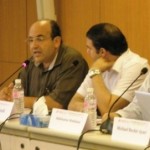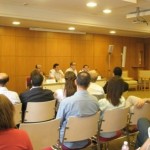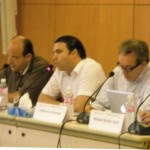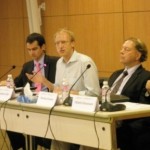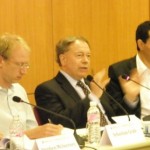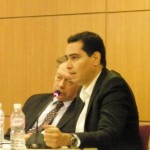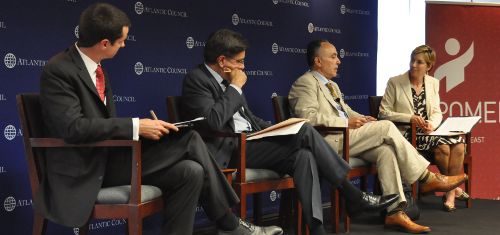————————————————————————————————————————
The event consisted of 2 panels, featuring: Joachim Paul, Heinrich Böll Foundation, Tunis; Moez Gueddas, Afkar; Stephen McInerney, Project on Middle East Democracy (POMED); Moez Joudi, Tunisian Association for Governance; Abdelsattar Mabkhout, PricewaterhouseCoopers; Michaël Béchir Ayari, International Crisis Group; Dr. Abdelwahab Benhafaiedh, Applied Social Sciences Forum (ASSF); Eberhard Kienle, Centre National de la Recherche Scientifique; Chiheb Ghazouani, Afkar; and Sebastian Gräfe, Heinrich Böll Foundation of North America.
In first panel, entitled “Challenges in Tunisian Socio-Economic Development,” Dr. Abdelwahab Benhafaiedh opened by noting that the real questions facing Tunisia today are both social and economic in essence. Tunisia’s transition, he contended, is truly a social transition – while the country is currently in a stage of state building, the biggest challenge is nation building. Freedom is a basic condition for development, and open civil society activity and collaboration is essential. Tunisia’s current economic challenges are related, primarily, to debt, unemployment, low wages, and insufficient regional development and support.
In his remarks, Moez Joudi focused on the current economic condition of Tunisia. He stated that it is common knowledge that economic problems were one of the central drivers of the revolution. Specifically, it was highly problematic that the former regime ignored development needs in the interior region. However, importantly, the pre-revolution economic condition was not as disastrous as some political actors now claim. Rather, Tunisia saw strong economic growth (between 4% and 5%), possessed wealth, had a good balance of payments and high levels of trade, held relatively little debt, and kept inflation relatively low. But, Joudi stressed, there was a high level of inequality, wealth distribution was uneven, and corruption was common. Tunisia’s socio-economic troubles were rooted in a lack of good governance, not difficulty creating wealth.
The revolution, Joudi continued, complicated Tunisia’s economic conditions. A strong economy requires public confidence – by Tunisians and by foreigners – and political stability. Now, Tunisia is in an economic recession, in which growth is between 1.5% and 2%, wealth has been lost, production has slowed, and inflation is high. Moreover, he reported that 280 companies had stopped operating in Tunisia, and unemployment stands at 19% (with 270,000 of unemployed people having higher education degrees). Instability has also caused a drop in tourism, and remittances are down. Joudi argued that Tunisia needs a better strategy to address its economic challenges, adding that ultimately, economic assistance will not make a difference if there is insufficient political and economic stability. For a genuine economic revival to take place, political stability and good governance are essential, and the Tunisian government needs to restore the people’s confidence in the economy.
Abdelsattar Mabkhout spoke next, asserting that although Tunisia suffered by living under dictatorship, it did develop into a modern state and took a leadership role in the region. While there was high-level corruption and many Tunisian businessmen benefited directly from their relationship with the ruling party, Mabkhout argued that corruption was not pervasive at lower levels. Now, he emphasized, Tunisia is in more than just a transition period, but a period of learning and education. He also contended that while the international community may be generally supportive of the country’s transition, the ultimate concern of states such as the U.S. is about Islamists and their possible connections to terrorism. Next, Mabkhout addressed the perception of Tunisia’s economic problems: yes, there are economic challenges, and yes, Tunisia needs to be integrated into the international market. But the most important step is building a system of good political governance, which is a daunting challenge. He called for a broad and long-term vision for the development of the country, including a real social compact that unites Tunisians. He called for a clean political system in which money does not drive politics and a sense of citizenship is developed.
Finally, Michael Ayari began by noting that the International Crisis Group has published three reports on Tunisia in the last 18 months, one about the revolution, one about transitional justice, and one about economic challenges. In those reports, the Crisis Group found that there were three main causes of the Tunisian revolution: unemployment, particularly of university graduates; inequalities between the coast and interior; and corruption. Clientelism was pervasive in Tunisia’s economic sector under the previous regime, and Ayari stressed the need for the government to get a handle on the large informal economic sector. Another key obstacle to economic growth is bureaucratic bottlenecks that hamper economic growth.
So far, Ayari continued, the new Tunisian government has introduced programs such as health care for all unemployed graduates, large subsidies for basic foods, and permanent posts appointments (a central demand of trade unions). Tunisians, he argued, are waiting for clear signs of development in their daily lives. One way to foster real change is to gradually move informal sector workers into the formal sector, ideally without a loss of livelihoods. The state must also establish a commission to rapidly increase development projects in the interior, as well as work to decentralize political and economic systems to help develop other regions of the country. Decentralization is key, according to Ayari, and the international community can best help Tunisia by working to train local administrations in governance.
During the audience question-and-answer period, it was suggested that Tunisia lacks a national consciousness and (problematically) turns to others for help before devising ideas and initiatives on its own. One person reiterated Ayari’s view that it is essential to formalize the informal sector, while another contended that the international community supported particular political parties in Tunisia illegitimately. Another brought up that some civil society organizations do not practice good governance, while someone else cautioned that Tunisia could recede to authoritarian practices if the people are not vigilant. Another audience member responded with a reminder that in some countries, transitions to democracy took decades, and called for patience. Yet another brought up the idea of opposition efficacy, arguing that the current opposition parties do not present real alternatives and policy prescriptions. The importance of having competent leaders was stressed, as well as the need to cultivate better relations with the Arab region and the international community more broadly.
In response, Moez Joudi said that the biggest threat to the national economy is poor and arbitrary decision-making. He called for the central bank to be fully independent, adding that politicians’ performance must be scrutinized and evaluated by the civil society community. Transparency is lacking, he said, and nongovernmental organizations can play a role in urging the state to be more open about its activity and about the state of the economy. He added that the international community has a positive role to play in investing in technology sectors in Tunisia. Abdelsattar Mabkhout added that opposition parties need to unite in order to be stronger, which Michael Ayari corroborated: in political transitions, ideological polarization does not help advance genuine democracy.
In the second panel, called “U.S. and European Assistance and Policy Strategies for Tunisian Political Development,” Sebastian Gräfe opened by asserting that the outcome of Tunisia’s democratic transition will have a significant impact throughout the region. Of course, this particular conversation came in the context of American and European budget constraints and constraints on democracy promotion overall – thankfully, Tunisia has one of the most liberal association laws in the region.
Stephen McInerney began by stating that Tunisia is viewed very positively in Washington, perhaps more so than any other country in the Arab world. As such, the U.S. is very supportive of providing assistance to Tunisia and is sensitive to indigenous demand, not wanting to provide assistance in a way that is perceived by Tunisians as unwanted outside intervention. McInerney explained that Tunisia is the exception to many regional rules on international assistance. Unlike other places in the region, Tunisia received a very small amount of U.S. assistance prior to its revolution. That carries both advantages and disadvantages: on the one hand, the U.S. did not have a large infrastructure and staff in place to support Tunisia immediately after its revolution, making it more difficult to respond quickly and disperse funds with speed. On the other hand, the relatively low level of U.S. involvement in Tunisia is positive in that the U.S. does not carry the baggage of having supported a Tunisian dictator for decades, which boosts U.S. credibility in the country today.
Another way in which Tunisia is different vis-à-vis U.S. assistance is that while other countries in the region receive a proportionally high amount of military and economic assistance, Tunisia receives a relatively large amount of democracy and governance support, as a portion of its overall assistance package. This demonstrates that democracy development is a higher priority in Tunisia than elsewhere. In the last 18months, the U.S. has given Tunisia about $385 million from over 10 different accounts. Some of that money ($100 million) was a direct cash transfer, some has been directed at security sector reform, and $45 million was given in direct grants to civil society organizations to work on civic education, voter education, capacity building for political parties, human rights advocacy, and private sector support, among other projects.
McInerney also emphasized that there is an interest in strengthening trade between the two countries, noting that Tunisia is the most likely candidate in the region to receive a free trade agreement (although creating one will likely be a slow process). In addition, there has been considerable debate in Washington about the merits of conditioning democracy assistance. McInerney asserted that in general, the U.S. should put more conditions on its aid throughout the region, so that assistance is tied more to performance, particularly on democracy and human rights issues. Consistency is important, since conditionality on aid to some countries but not others will send a dangerous mixed message. Tunisia just became the fourth country in the region to receive Millennium Challenge Corporation funds, which are conditioned on meeting a variety of good governance benchmarks, and the newly-proposed Middle East Incentive Fund puts a strong emphasis on political reform.
Next Eberhard Kienle spoke in broad terms about the appropriateness of international democracy assistance. At a minimum, he explained, democracy is a system in which citizens are able to select their rulers and choose the policies that are applied to their society. Genuine democracy requires that citizens possess a degree of equality (among themselves and vis-à-vis the rulers) and that the government’s power is checked, both by itself and by the ruled. In many authoritarian regimes, there is a theoretical balance of power – in reality, however, power is monopolized.
For democracy assistance to be effective, Kienle continued, it needs to support the relative equality of citizens among themselves and support the ability of citizens to confront their government. One form of democracy assistance is support for civil society. If democracy promotion strengthens civil society’s ability to both support and challenge the government, then it can be considered successful; however, it is important to remember that sometimes civil society activity is limited to certain classes of people, since there may be barriers to entry or activity. As such, democracy assistance must be provided with an eye towards enabling all citizens to affect change in their government. Another form of democracy assistance is supporting the private sector and economic reform. In the past, Kienle contended, assistance for economic reform has often increased inequalities in many parts of the world. Therefore, it is important to remember that economic growth does not ipso facto contribute to equality between citizens and to balancing the relation between citizens and their government.
Europe, in Kienle’s view, can help further democracy around the world via the “3 M’s”: money, markets, and mobility. This means that funds can be provided to transitioning countries, markets can be opened, and mobility can be enhanced, allowing citizens of transitioning countries to travel to Europe. The success of these tools depends on how and where funds are provided, whether assistance is equally distributed or whether it merely further empowers those who are already empowered, and whether market access is open to all or a few, among other factors. Thus, he concluded, democracy assistance is a complex endeavor and its success in actually advancing democracy in a country depends on a range of factors.
Finally, Chiheb Ghazouani began by expressing some discomfort with the notion of Tunisia accepting a lot of foreign debt, in part out of concern for Tunisia’s ability to pay it back, and also to protect national sovereignty. He said that Tunisians were very pleased when American and European officials expressed rhetorical support for Tunisia, but added that much of the funding that has been pledged to Tunisia has not been delivered. In the economic sector, Ghazouani argued that direct aid to the Tunisian government is not ideal. Rather, the international community should support education and infrastructure projects, in addition to microfinance programs in rural regions. He also recommended that Tunisia diversify its economic partners and strengthen relations with emerging economic leaders like Turkey and Brazil. In addition to financial support, it is important that the international community provide support in other ways, as well, and that partnerships between Tunisia and the U.S. and Europe should be based on mutual respect and interdependence. Specifically, Tunisia needs support in improving security and education. In the security sector, the country must enhance its border security with Libya and Algeria. In the education sector, Ghazouani stressed that Tunisia needs to use education as a means of strengthening Tunisia’s relations with the West, adding that there should be an increase in educational exchanges and the availability of publically-funded technical universities. Furthermore, Ghazouani called on the international community to support civil society, not political parties. He concluded by emphasizing that Tunisia and the international community should learn from the mistakes of other democratic transitions and can hopefully move forward in a productive partnership.
During the audience question-and-answer period, one audience member argued that democracy has less value for people that lack basic necessities, and that the first step should be addressing those needs. McInerney responded that people in Washington recognize that the revolution was sparked by difficult economic conditions and that Tunisia’s development challenges cannot be ignored. He reminded the audience that the bulk of U.S. assistance to Tunisia is for economic development programs. It was also stressed that the democratic transition should be an inclusive process, and that the international community’s relationship with Tunisia should also be one with the Tunisian people. Another audience member brought up the issue of Tunisia’s image in the world, while another asked the panelists about U.S. relations with Islamist parties. On the question of Islamists, panelists responded that the U.S. should not rely on a relationship with a single actor; rather, McInerney stated, “the U.S. needs to engage a wide variety of actors in Tunisia – not just political parties but trade unions, business leaders, etc.” One audience member asked about how Tunisia can make economic reform successful and serve as a model for elsewhere in the Arab world, and another gave his assessment that U.S. aid before the October 2011 elections was targeted at helping Islamists win the elections (to which both McInerney and Ghazouani responded that that was not the case). Relatedly, another asked whether combating terrorism and fighting religious extremism will be a main focus of U.S. policy towards Tunisia moving forward.
On another topic, one audience member stated that while there needs to be cooperation between the U.S. and Tunisia, the U.S. image has suffered due to the failures of previous administrations; thus, U.S. assistance to Tunisia must be designed with an eye toward improving its own image among Tunisians and with the goal of fostering a genuine partnership. McInerney responded that as governments in Tunisia and the rest of the Arab world become more democratic and accountable to popular sentiment, naturally the U.S. will need to take into consideration its image among the greater public. A member of a local civil society organization asked for advice on how to initiate people-to-people contact with Americans. Ghazouani concluded the panel by stating that Arabs themselves must work to improve the image of Arabs – it is when they build accountable governments and transfer power peacefully between different actors that they will truly be respected throughout the world.



